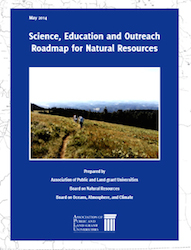There are six “grand challenges” facing the United States over the next decade according to a report from the national Association of Public and Land-grant Universities (APLU). The challenges include sustainability, water, climate change, agriculture, energy and education. The APLU project was co-chaired by W. Daniel Edge, head of the Department of Fisheries and Wildlife at Oregon State University.
 Edge said “Science, Education, and Outreach Roadmap for Natural Resources” is the first comprehensive, nationwide report on research, education and outreach needs for natural resources the country’s university community has ever attempted.
Edge said “Science, Education, and Outreach Roadmap for Natural Resources” is the first comprehensive, nationwide report on research, education and outreach needs for natural resources the country’s university community has ever attempted.
“The report identifies critical natural resources issues that interdisciplinary research programs need to focus on over the next 5-10 years in order to address emerging challenges,” Edge noted. “We hope that policy-makers and federal agencies will adopt recommendations in the roadmap when developing near-term research priorities and strategies.”
The six grand challenges addressed in the report are:
- Sustainability: The need to conserve and manage natural landscapes and maintain environmental quality while optimizing renewable resource productivity to meet increasing human demands for natural resources, particularly with respect to increasing water, food, and energy demands.
- Water: The need to restore, protect and conserve watersheds for biodiversity, water resources, pollution reduction and water security.
- Climate Change: The need to understand the impacts of climate change on our environment, including such aspects as disease transmission, air quality, water supply, ecosystems, fire, species survival, and pest risk. Further, a comprehensive strategy is needed for managing natural resources to adapt to climate change.
- Agriculture: The need to develop a sustainable, profitable, and environmentally responsible agriculture industry.
- Energy: The need to identify new and alternative renewable energy sources and improve the efficiency of existing renewable resource-based energy to meet increasing energy demands while reducing the ecological footprint of energy production and consumption.
- Education: The need to maintain and strengthen natural resources education at our schools at all levels in order to have the informed citizenry, civic leaders, and practicing professionals needed to sustain the natural resources of the United States.
“The natural resources issues with traditional sources of energy already are well-understood,” George Boehlert, report co-author, said, “with the possible exception of fracking. As the country moves more into renewable energy areas, there are many more uncertainties with respect to natural resources that need to be understood and addressed. There are no energy sources that do not have some environmental issues.”
The project was sponsored by a grant from the U.S. Department of Agriculture to Oregon State University, which partnered with APLU and authors from numerous institutions.

